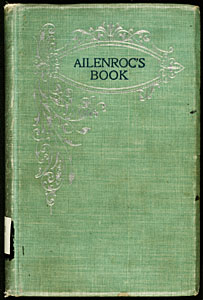Mrs. Alexander’s tale entitled “Smart Little Paul” is a true story, as she seems to indicate at the end (this is also supported by the fact that she only revealed to us the initial of the family’s last name, a common practice in classic literature when a name was not known or the author wanted to conceal it). And it illustrates, I believe, one of her “pet peeves” if you will. However, I am having a little difficulty in figuring out what exactly bothered her about the situation.
I can certainly say that I disagree with Dr. and Mrs. F——’s parenting methods, and I agree with the conclusions Mrs. Alexander and her friend made at the end of the story:
“I don’t think that boy will make a good man,” I answered. “His parents brag on him so much, he will be all conceit by the time he is grown, and a swindler and gambler, most likely, as his father says ‘he will do anything for money.’”
However, it’s clear that it is not only the greed, selfishness, and love of money that shocked Mrs. Alexander and her friend. It also had to do with the fact that this money-making was being done on the Lord’s day:
[M]y friend remarked as the door closed behind them: “Now you see what makes bad children; and that is just the reason there are so many bad men in the world. Children are brought up with no regard for the Lord’s day, and parents are to blame for it.”
Did they consider this work, and thus not appropriate for Sunday? I am not really sure. It is clear though that this all had something to do with it being the Lord’s day. What do you think? Can you give me any insight on this unique story?
It was partially because of things like this that I was attracted to Ailenroc’s Book. She was a member of the Lord’s church, and I find it interesting to see her beliefs through her writings, and see how they differ from those held today. Of course, she was incorrect to think that certain things are forbidden on Sunday; this belief tries to borrow from the old Jewish law. But all in all, those things she believed were based on the truth of Scripture, and I am comforted to think that even then, 110 years ago, there were God-fearing Christians in this country, serving Him as He specified in His Word.
Now, discuss! That’s what this post is for, after all.
 There are many characteristics that could be said to define this time in history, but one that stands out to me in particular is that of communication. In the twenty-first century, more than ever before, much of mankind has access to technology that aids in long-distance communication. We have advanced from the telegraph to e-mail and Facebook, and although telephones are still in use, their functions have been both augmented and changed by the passing of time. We have Skype now, as well as texting and instant messaging. And as the number of ways to communicate through electronic devices increases, I fear that more traditional communication methods are being minimized. Why should I walk down the hall to ask someone a question, when I can just text them? Why write a thank-you note, when there are equally delightful e-cards? Why write letters to your mother back home if you can just call her on your cell phone anytime you like?
There are many characteristics that could be said to define this time in history, but one that stands out to me in particular is that of communication. In the twenty-first century, more than ever before, much of mankind has access to technology that aids in long-distance communication. We have advanced from the telegraph to e-mail and Facebook, and although telephones are still in use, their functions have been both augmented and changed by the passing of time. We have Skype now, as well as texting and instant messaging. And as the number of ways to communicate through electronic devices increases, I fear that more traditional communication methods are being minimized. Why should I walk down the hall to ask someone a question, when I can just text them? Why write a thank-you note, when there are equally delightful e-cards? Why write letters to your mother back home if you can just call her on your cell phone anytime you like? A few years back, my sister and I were looking through some of our grandmother’s books in a back bedroom when we came across one with a curious title. The words Ailenroc’s Book grabbed our attention, and as we gingerly opened the frail green volume we soon discovered who Ailenroc was. She wrote in the short preface “I do not think I shall live to see [this book] out, but I want to bespeak for it a kind reception. Of faults it has many; but I am sure they are not of the heart, and it is a pleasure to me to think that I have written nothing that can do harm.” Ailenroc, or more properly, Cornelia Alexander, was an elderly Christian lady of Alabama.
A few years back, my sister and I were looking through some of our grandmother’s books in a back bedroom when we came across one with a curious title. The words Ailenroc’s Book grabbed our attention, and as we gingerly opened the frail green volume we soon discovered who Ailenroc was. She wrote in the short preface “I do not think I shall live to see [this book] out, but I want to bespeak for it a kind reception. Of faults it has many; but I am sure they are not of the heart, and it is a pleasure to me to think that I have written nothing that can do harm.” Ailenroc, or more properly, Cornelia Alexander, was an elderly Christian lady of Alabama.